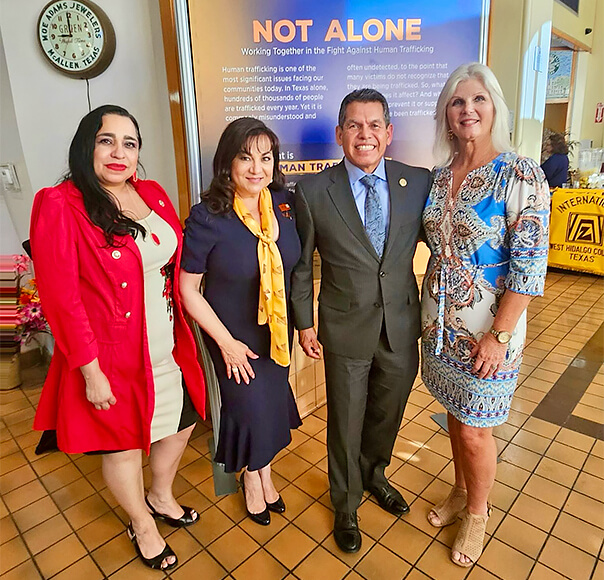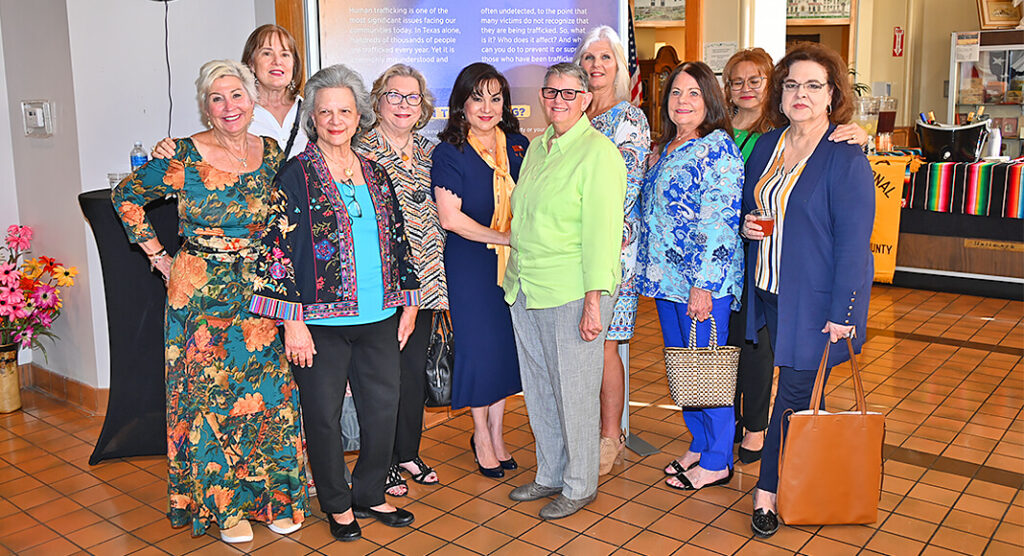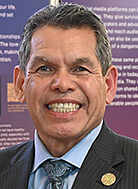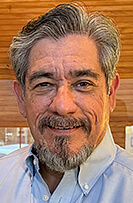
Texas Border Business
By Roberto Hugo González
For sixteen years, Elva Cerda has been at the top of the McAllen Heritage Center Museum of History and Culture, guiding it through many exhibitions celebrating the rich tapestry of the region’s past and also confronting today’s pressing issues. Among these, a powerful exhibit stands out, making waves in the community and beyond: “Not Alone: Working Together in the Fight against Human Trafficking.” Sponsored by Zonta Club of West Hidalgo County President Annette Franz and a large group of distinguished ladies.
This exhibit shows a commitment to shedding light on dark truths, especially in a region where the shadows of human trafficking loom large. This compelling panel exhibit has captivated visitors since its opening on March 6, with plans to run through April 10, 2024.

In a candid conversation, Cerda shares the journey of bringing this critical exhibit to McAllen, a process marked by anticipation and a drive to educate the community about the grim realities of human trafficking. The exhibit originated from the Bullock Texas State History Museum and reflects a collaborative spirit among institutions dedicated to making a difference. “It took two years for us to get it,” Cerda reveals, stressing the determination to host the exhibit despite the logistical challenges of securing a traveling showcase.
Cerda’s pursuit of the exhibit was fueled by a conversation with Annette Franz about the harrowing depictions of human trafficking in the film The Sound of Freedom. This discussion and Cerda’s awareness of the issue fueled a resolve to confront the subject head-on, regardless of its difficulty or the uncomfortable truths it may unveil. “It’s all around us here,” Cerda acknowledges, highlighting the prevalent threat of trafficking in border regions and the importance of public awareness.

Cerda’s vision for the McAllen Heritage Center transcends the traditional museum experience. By engaging with contemporary issues like human trafficking, the museum serves as a platform for education, reflection, and action. Exhibits like “Not Alone” and previous showcases on figures like Cesar Chavez are part of the mission to bring diverse narratives and critical conversations to the forefront of community consciousness.
In a revealing discussion, Hidalgo County District Attorney Toribio Palacios emphasized the critical distinction between human smuggling and human trafficking, underscoring the prevalence of the latter in the region. Palacios highlighted the challenges in identifying human trafficking cases within the community, noting that individuals from low-income backgrounds and those living in indigent conditions are particularly vulnerable to exploitation for labor and sex trafficking. The District Attorney’s office, through its major crimes division, collaborates with federal agencies to address cases involving human trafficking, reflecting a concerted effort to combat this hidden crime. Palacios stressed the importance of community vigilance and the role of public awareness in safeguarding the vulnerable, urging residents to report any suspicious activities that may indicate human trafficking. His attendance at the awareness event “Not Alone: Working Together in the Fight against Human Trafficking” signals strong support for initiatives that aim to illuminate and tackle the issue of human trafficking in Hidalgo County.
Alejandro Rodríguez, a special agent with the US Fish and Wildlife Service, attended the “Not Alone: Working Together in the Fight against Human Trafficking” exhibit at the McAllen Heritage Center, drawn by a personal and professional connection. His interest in human trafficking, particularly sex trafficking, is fueled by his role as a law enforcement officer and father, emphasizing the importance of recognizing and preventing these crimes. Rodriguez highlighted the critical role of vigilance and the courage to report suspicious activities, particularly in his work at ports of entry where victims are often trafficked. He praised the exhibit’s effectiveness in raising awareness through its audio and visual presentations, which further educated him on the topic and reinforced his commitment to fighting human trafficking.
The museum’s welcoming approach to visitors, with free admission and accessible visiting hours, is designed to remove barriers to education and engagement. Cerda emphasizes the museum’s role as a community resource, inviting people from all walks of life to learn, reflect, and perhaps be moved to action by the stories and information presented within its walls.
As the exhibit draws to a close, Cerda looks ahead to the future, confident in the museum’s ongoing role as a light of knowledge and community engagement. The success of “Not Alone” is a powerful reminder of cultural institutions’ impact in raising awareness of critical social issues. Through partnerships, perseverance, and a dedication to truth, the McAllen Heritage Center Museum of History and Culture continues to shine a light on the shadows, inviting the community to stand together in the fight against human trafficking.
McAllen Heritage Center, 301 S. Main St., La Plazita Park, southside of MHC. Limited free parking is available in the rear of the building.
















